Convention - SDCC 2020 : Charlize Theron Evolution of a Badass - An Action Hero Career
By Mulder, 24 july 2020
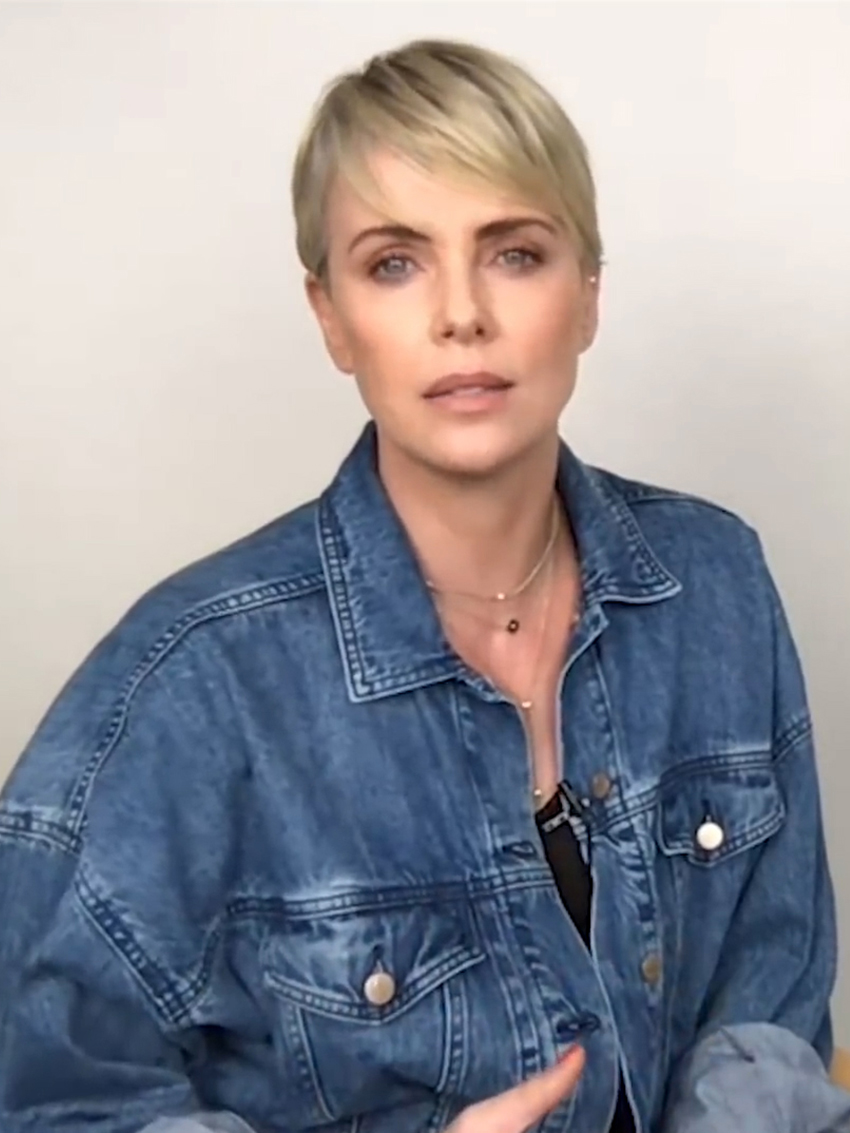
Terri Schwartz : Hi everyone and welcome to a very special panel with Charlize their own a retrospective on her Action Hero career as a total badass. Charlize is known for her incredible ranges of performer and over the past few decades. She's really cemented herself as one of our best and most impressive modern action starts but their latest movie the old guard out on Netflix. We're going to look back at some of the most iconic roles and hear her breakdown her journey and evolution into her own world so thank you Charlize with that introduction for being here and taking the time to do ours you know again I put that all in context but I'm curious at what point in your career did you know that you wanted to transition into focusing on more action focused roles.
Charlize Theron : You know I don't remember a specific moment. I don't think it was like you know like I woke up one day and I said you know what I'd like to do action movies. I thing that I have just always wanted to explore it there just I never had the opportunity to I mean just for you to understand like I was raised with the mother who loved Chuck Norris movies and Charles Bronson movies so and my dad loved the Mad Max films. I was raised on action films like that's the majority of the movies that we watch were those kinds of movies and then you know through you know my it was peppered with a little bit of like you know Sophie's Choice and Kramer vs Kramer. It's like super inappropriate ages like eight nine and ten but I think it's summed up where my career went I always had an affinity for all of the genres you know unfortunately 30 years ago there just wasn't a lot of opportunity for women to do movies like this and the first time that that opportunity kind of showed itself was after I won my Academy Award and 2004 and it was really hard making that film in flux it was really hard in the sense that there were so many preconceived ideas and there were all these boxes that everybody wanted to kind of like squeeze you into it was a character that I think today would be celebrated you know cinematically way more than it was in 2004 it's just hard and I remember the film not really you know didn't play as well as everybody thought and there was just this moment in my career where I realized very clearly that because that movie didn't really perform that I wasn't necessarily maybe I wasn't going to be given another opportunity and it was really harsh it was like no women can't make these movie successful it was harsh and it wasn't until Mad Max fury road key my way that I you know they got experience and what happened with that film really changed the trajectory for me and it made me realize the wait a second like there's a lot of possibilities here you just have to find the right people who are willing to take the risk and wanted to go want to explore these stories with with women and I made an active choice to look out for those filmmakers to look out for that kind of material to try and develop it myself as produced as a producer and that's kind of where I find myself today I really like playing and and all the different genres I don't think of myself as you know having a particular affinity for just one and the good news now is you know we've kind of changed the genre for women I think it's very there's great evidence where we now know it's you know we can't hide behind ignorant anymore audiences love these films they love how we're now telling these narratives with women at the core it's made for I think the stunt world it's given it just you know there's just a facelift it's just it feels fresh to kind of explore the world of action with women with women fighting and all of that stuff really excites me
Terri Schwartz : You touched on so many things there that I wanted to dig in deeper with you because I think it is interesting you know. It was one of my questions. I wanted to ask you but you kind of answered there is what you would consider your first almost action role because I default to and flex but then I'm curious if you know the Italian Job two is kind of your first introduction in that space to a lot of people but like you said you know with Aeon Flux there was this perception that I feel like we're discussing and hopefully continuing to overcome that if one movie that tries something different fails like a female action hero movie failed well we can never touch it again but you did continue to go on and it sounds like you were actively pursuing finding those roles like with Hancock and Prometheus and even Snow White and the Huntsman up through Mad Max fury road but that was Something that you continued you know looking out for you so if I'm not putting words in yourself looking out for yourself but making sure that that door continue to be open.
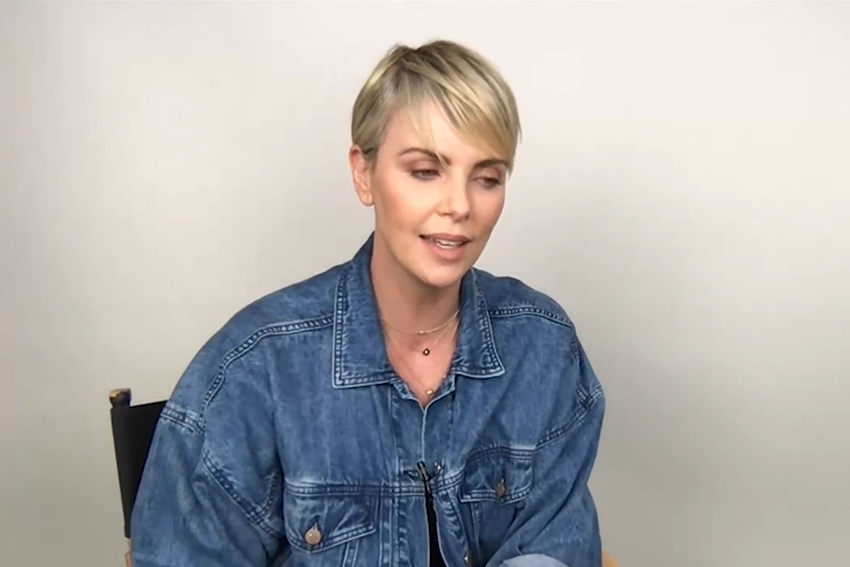
Charlize Theron : Yes very much though I mean anything you're right we can't just look at action is just physical for sure the Italian Job was a great experience in the sense that I realize there was still so much misconception around women in the genre even though that film is the action is really based on on cars we had to physically do a lot of that stuff I mean the only good thing that came out of that experience was that there was a real pressure to pull off those stunts with the actors and that was the first time I experienced anything like that but there was there was a very unfair process that went with that you know I was the only woman with a bunch of guys and I remember vividly getting the schedule in our pre-production and they had scheduled me for six weeks more hard training than any of the guys and I just it was just so insulting but it was also the thing that put a real fire under my ass and I was like all right you guys want to play this game let's go and you know I made it a point to I'll Drive all of those guys I vividly remember Mark Wahlberg halfway through one of our training sessions pulling over and throwing up because he was so nauseous from doing 360s yeah um but I was very proud of the stunt work that we did in that I mean I did a stunt in that movie where I do a three a reverse 360 or maybe 180 in a warehouse with props everywhere and people and I did that stunt completely on my own and it was like it was a huge moment like feeling like yeah we can do all of this stuff and women are so unfairly thought of or treated when it come to comes to this genre.
Terri Schwartz : It's interesting you talk about that because that is one thing you know when I went back and I was watching these films in preparation for this not only kind of the trends in the action genre and how movies were shot where you look at me on flex and it was at a time when a lot of action scenes were like these quick cuts together to ramp up performance then you get to what we have today with you know Atomic blonde in the old guard and you have these like just impressive single take shots all in frame showing the artistry of spent choreography and really putting it on the performer to come and say okay it's as much as you can kind of put into it how is that it sounds like you know obviously you've put in the work who's seen it it's amazing for these movies but how is that kind of evolution changed how you approach the stunt works that you want to participate in these films yeah
Charlize Theron : such a great observation I really didn't know anything about that either until I worked on atomic blonde and it was really all of the stunt coordinators on that film who set just from the from the get-go that the tone was set we want to do long action takes we want to do continuous I mean was the first time I think we listened I don't know like historically but I know that there was a real attempt to do a first which was asplice together take which really played as one but it meant that logistically we had to shoot seven to ten minutes of action continuously and I know that sounds like nothing but as a performer that means that you have to get everything right in seven to ten minutes and that is an incredibly difficult thing to do especially for actors and then for myself I'm not I'm not a martial arts fighter I've never trained in martial arts but but it's plausible and that's what's so incredible and I was really proud of the action that we accomplished an atomic blonde it felt to me like we were pushing the envelope and we were saying that this concept that was that somehow women in the industry have been arguing to fight like men it's just so ridiculous and then when we celebrate women fighting like women and then we're smart about what body parts we would be using that we know we can't really punch because well we will break every bone in our hand but that we can fight just as hard with our elbows with our heads with our knees the that was when it became really exciting to me and you know I think that what's great is that there is no one way but that we are definitely pushing it you know you can look at a film like fury road and there's there's definitely more edit in that film George Miller style and shooting as action is fast paced but it's done in a way that doesn't feel like a cheat you know I think editorially we've always cheated action and when you don't cheat it people really know they can feel it and that authenticity has really I think been celebrated in the last decade. It's also made it really hard for crappy action movies to survive because the bars main sets they're high.
Terri Schwartz : you look at especially something like Mad Max and you're just like yeah I've read the story as I've watched them behind the scenes but I can't even him you know I can't even wrap my head around what went into actually making that movie because it feels so visceral just sitting down and watching it from the comfort of my couch.
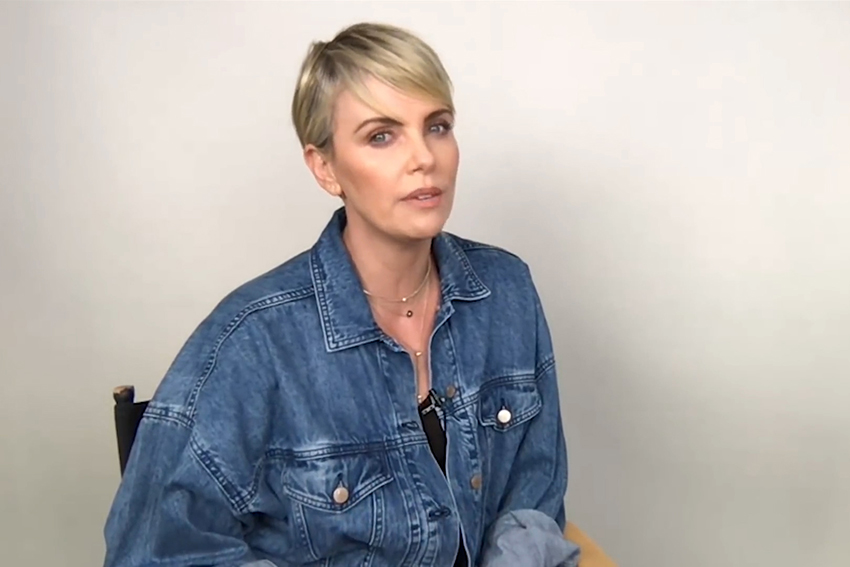
Charlize Theron : listen I don't think it will ever recover from the making of that film it was it was a feat what we pulled off all of us it was hard it was difficult it was difficult in a different way than what I was just talking about with atomic blonde and those continuous scenes and long play action in the sense that the physicality was very real that was very very rare that George wanted the stunt team to rely on too much wire work and so a lot of like physical lifting in that movie was real like holding your body up on a car or pulling yourself out of a car and getting over to another vehicle or action that was happening on driving vehicles consistently it was incredibly tedious and but that was the challenge in that and and you know I think when a filmmaker can listen to you know just the narrative a story of Mad Max is supposed to make you feel incredibly exhausted you're supposed to be on a three-day car chase and that is just exhausting and it became it was an exhausting shoot I mean he physically got us all to a place where none of that was was being manufactured it came from such a real place well.
Terri Schwartz : I love you know it's really interesting that your fruit of that is feeling like a big turning point for you which I can completely you know understand and I read a quote that you said when you were talking about the roles that you find yourself gravitating to is you know especially in the action genre is they you said they aren't victims but they also aren't superheroes and you look at a character like Furiosa and yes Mad Max is by its title a Mad Max movie but Furiosa is really the main character the central driving a hero of that story so when you look back at characters like Furiosa and you and Andy like what are you what draws you to these roles in addition to the action opportunities that you get in these films.
Charlize Theron : I think in general I'm intrigued by I guess the messiness of being a human especially a woman and I think that for me when we talk about representation not just racial representation and cultural representation but female representation. I remember vividly just feeling such a lack of watching conflicted women on cinema I felt like there was always a part of me as an actor that told so unbelievably jealous of people like Jack Nicholson and Robin De Niro who got to play all of these really people and women very rarely got to explore that it was like there was this an arid fear of putting a woman in circumstances where she might not shine and it was I do believe you know society has a still somewhat in this Madonna whore complex box like we can either be really good hookers or we can be really good mothers but anything in between people are sometimes not brave enough to want to go and explore and it's so sad to me because the richness of those stories are not actually not only great entertaining stories to tell great movies to make but it's a disservice to women in general we are more complicated than those two things and we can be many things and that our strengths can come from our faults and from our mistakes and from our petty and our and our vulnerabilities and and our madness like those are those are the things that make us interesting and so I've never ever I have a knee-jerk reaction when anybody ever pitches me a story or has this like you know first line like she is a warrior and she is a hero it's simple it oversimplifies I think the complexities and the beauty of what it means to be a woman and I've never ever strived to inherently underlying those qualities and any of the characters that I play I think all of my characters have had this sense of they're all survivors they're all just trying to survive and that I can relate to as a woman I can relate to that I am NOT a hero. I don't relate to heroes I think people who inspire me or people who don't think of themselves as heroes they're they put their head down they do the work and I I rely I I can I don't know I have an affinity for that I like that and that is a quality that I really respond to and so I don't want my women the characters that I play I don't want any of them to feel like women that we can sit in a cinema and say yeah I see a little bit of myself in there.
Terri Schwartz : I read the great New York Times piece that was put together looking back at the five-year anniversary of Mad Max fury road and a lot of what was discussed and there was how you know when you guys were there on the ground you were you were trusting in George for his overall vision but you didn't have kind of that full perspective of what the finished product would be I'm curious now five years later and you look back at who Furiosa is now for so many people and what that movie is what is your perspective on what you guys ultimately created and in that character.

Charlize Theron : I am incredibly proud of what we pulled off I really am I'm I'm really proud of that character Furiosa is definitely one of I think the most important characters I've ever played and I saw the potential I knew how special it was right from the beginning and I chased it really hard because of that I saw I saw something that I'd never seen before as an opportunity for myself as an actor and I think it was to show a female character in a way that felt I don't know just it the closest thing that I can kind of the analogy the the closest moment in my own life that I can look back to was when the first time I saw Sigourney Weaver play Berkley it just changed everything for me and it was like the world opened up and the possibilities were just endless the amount of intelligence that she brought to that role she was completely in demand of it was she owned that world but it wasn't forced and it wasn't written and it wasn't acted it was just lived and it was she was she just living in that world in such an authentic way and Furiosa was the first time that I really felt like I couldn't even look at her as a character she felt so real to me and maybe it was because the she was so hard the fact that we were there for so long that we really did live in that environment for so long that made me feel that way about her I don't know if that you know if that character can in a small part do what Ripley did for me as an actress as a woman that's something that I'm incredibly crowded that doesn't happen in everybody's career and I feel really lucky that I was given that opportunity that I was prepared for that opportunity and that I was willing to you know to lay it all to lay it all out there to really to give it my own.
Terri Schwartz : it's amazing and then you know you've been producing your own movies since Monster but I looking back and kind of reading up on the trajectory of things you came off Mad Max fury road and you had Atomic blond option for a while to produce and I you know I look at that story and that that is a title that feels like it was really important to you not only did you watching it but you pursued David Leitch as director you know after seeing his work on John wick and you helped push the action scenes in that movie to be as impressive as they ended up being through you know reading interviews with various choreographers and everyone who worked on it so why was that movie so important for you and what does it mean to you now it's you know that point in your career.
Charlize Theron : it was the first time that I developed something from such a small tiny little kernel I mean we there was an unpublished graphic novel.We were sent eight pages. It wasn't even finished and we said I said yes to those eight pages. I think the reason why I pushed as hard as I did on that film was because you know and this is just a sad truth there's still a part of me as a female actor that always feels like this might be the last opportunity and that's a war it's terrible but that's kind of in my psyche it's also the thing that drives me and puts a real fire under my ass to get it right and I was relentless on that film and because we were I felt like there I carried her responsibility since I was developing it that I couldn't kind of look back and say well you know it was a script it was I was in charge of everything and I I didn't want to get it wrong I wanted to get it right because because there's a part of me that still you know I still sometimes feel like that that if you get it wrong at one time it's kind of like when we were talking about with the on flex that you just will not be given that opportunity again and listen this this my kind of entry and into action is come much later in my life you know I I made atomic blonde when I was 40 years old there's a sense of like feeling like okay time is running out you got to get it right if you really want to but this means as much to you and you and you want to kind of stay in this game you got to get a right and so there was a lot of pressure I put a lot of pressure on everybody on that movie I hire david leitch for that reason that he could handle it you know. I said to him you're I'm never gonna stop and I'm gonna expect you to never stop and like me do me any kind of mediocracy is going to be the enemy on this film and when I look back at the behind the scenes I mean both of us that whole team Sam Hargraves who now has his own career as a director who shot a lot of those action pieces we left it all on the dance floor we really did and again you really are as good as the people that you get to work with I mean. I was very lucky that I got to work with really good people and that some great people on that film well.
Terri Schwartz : You talked about some of these sequences in movies like making you tire as the viewer watching this stick I am tired with you is just keeps getting knocked down keep setting incredible you know I know obviously David and we're doing John wick before but you know now as you as you have this sense of ownership which is so exciting to see in like you know you creating the projects right and championing the projects that you want to make that you want to star in do you for have that sense of like you look another movies that are happening in the space or the creators who are working out there and you're like I want to do that I can do that I want to pursue that we feel like you you are you're able or do you have a curious view is that even kind of how you approach looking at which projects to take naps
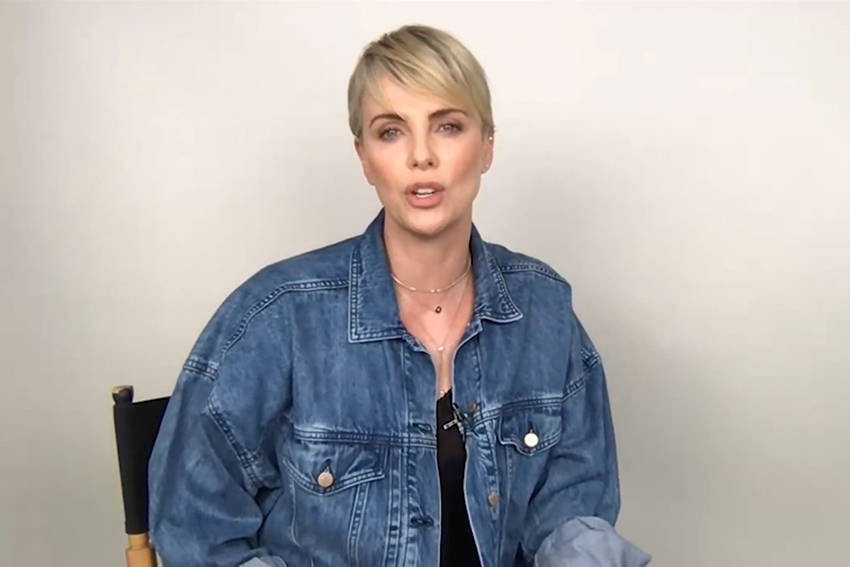
Charlize Theron : very much so yeah and I feel really lucky that there are other women doing this at the same time you know people who I consider friends people like petty gent Patty Jenkins who you know she's really kind of raised that bar as to what you know that type of movie looks like and feels like I'm constantly inspired by what other women are doing out there and I'm also inspired by how we're all backing each other up how we still want each other to succeed for the sake of everybody you know we realize here in this position where you get to have the opportunity there's there is there's a responsibility to hand that baton over to open the door to keep it open that it's not just about you and then not since it's been really amazing to kind of see listen it's still disproportionate to you know our male counterparts out there we have to we have to kind of just keep putting the pressure on our industry to change that but I'm constantly inspired I want I want my group my two young girls they won't mind two young girls to grow up and not even think that this is weird or that this is unusual or that this is strange I want this to be normalized.
Terri Schwartz : yeah I I fully agree and I love that like even sinks atomic blonde you came out there's a reveal in the fate of the furious cipher is the real big bad the whole time you're are you're a villain in that and then we get caught up to the old guard as well and watching the old guard and seeing that scene for you and Kiki Lane or just duking it out in the airplane that's flying by and I was just like gosh this action is so cool and it's weird that like I've almost come to expect it now especially from Lake Bennett back channel is you twos are like yeah of course Charlize would like be having this incredible long tape in there putting all this into it yeah I'm curious like what was it about this part in Andy and the comic that really spoke to you and I know from reading kind of the production material and see interviews behind the scenes that this even from everything you did before required an additional layer of training because Andy as a character had such a wealth of you know different fighting expertise by virtue of being millennia old.
Charlize Theron : yeah I mean I think for me the first thing that kind of grabbed me was just seeing a lot of potential in raising the physical bar that action bar I felt like this world really lend itself these characters the circumstances and the set pieces really lend themselves to really challenging acting action action and I think that was one of the first things that I noticed but I'm I don't think I would ever want to just make a film based on how great I could create action scenes there was very much an emotional story here that resonated even though this is a sci-fi story that feels incredibly grounded in reality and I think the struggle with humanity in this is very ever-present present even just looking at where we are and we find ourselves today in this kind of social and cultural place that we're in this story lives and breathes very much in that which is unusual I think sometimes in sci-fi but I think I might taste is just always going to you know movies like Prometheus like if there is not an emotional connection that I can kind of like hang my coat on I don't it's very hard for me to invest and I think when you find a piece of material that lends itself to both you realize how special that is and when I read this graphic novel I saw great potential for us to celebrate both of those boxes and push the envelope..
Terri Schwartz : I you know I had this when I read the graphic novel for the first time I was just so impressed by kind of the scope and inhumanity of these characters and it's so interesting how you guys in viewed that and brought that to life on the Netflix and in the show I'm curious like how have some of your experience is almost layered on each other fed into each other because I hear you talk about going from Mad Max 2, Atomic blonde and I can imagine like the scale set from going from atomic belong to the old guard is the same like what do you bring with you and what are you looking to challenge yourself with in these Falls
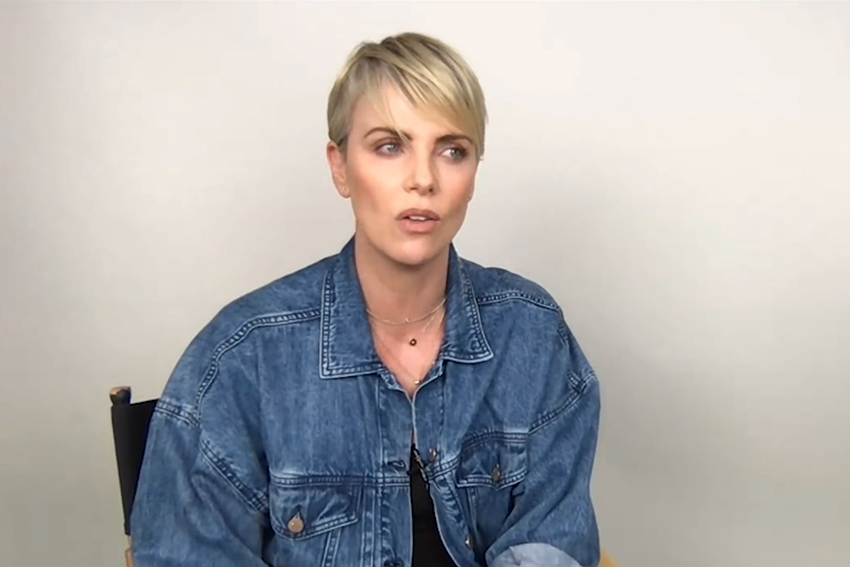
Charlize Theron : I think you've touched upon it earlier you know there's a difference in style of fighting so that's always nice right so you're hitting the gym and realizing you're gonna learn some new skills there was a sense of fighting in most of the movies that I've done the even though there's a skill level and there's a style of fighting. I still played women where I mean they were allowed to get scrappy you know and so when you can get scrappy you can hide a lot of blood a lot of things in this case I couldn't because this character is so skilled and her wealth of information just in martial arts is thousands and thousands of years old anybody who knows anything about martial arts knows that the discipline that goes behind you know learning any kind of martial arts is is so gnarly I have read books of martial arts fighter martial artists who you know give everything up and go live in a hut in Thailand for 40 years and that's to learn one style of fighting so we knew that was definitely an obstacle the narrative of trying to get that story across had to be very specific we had four months and we had to really hone in on the things that I could really excel at and so that that first of those first couple of weeks when you walk into the gym you're really trying to assess you're trying to see what you can excel and what you shouldn't even be wasting any time on and that's when you know you have a good team and Danny Hernandez or fight coordinator on this was really rgood at watching me and realizing that we never wanted to force a circle into a square we had what we had and we had to figure out what could shine out of that and so a lot of it was for me focusing you know for me in the beginning I think when I started my action career it was so important to sell the authenticity of like yes I can't buy and I can I can't take this guy down and I can't survive this like there was such a level of like wanting to prove that to audiences who for years said like no woman could never fight a guy that size in this case it wasn't so much like yeah I can take the guy down it was like I can take the guy down with real technique and so that I had never really I never had to work on before.
Terri Schwartz : I wanted to end kind of with a forward-looking question I read this quote from your partner your production company Denver and Delilah AJ Dix he told the New York Times that quote to his to their mind nothing scares you and I'm curious for you at this point do you feel that do you feel that that's true do you feel like there are things that you look at you're like that's too intimidating or much or does that just kind of drive you to rise to the challenge on what that thing would be
Charlize Theron : I think that the essence that I put forth then there might be no fear is completely motivated by fear I think I I think I just cover it up but the truth of it is that everything actually scares me I don't know really how to create not from a place of fear not that I'm saying that you can't I just I just have never I don't know if I ever could I think the idea of going into a project and not being scared would actually freak me out it would feel really wrong I think that my creativity really thrives around my fear I think I'm just very good at covering it up and I think there's a part of how I was raised that made not that it necessarily is the right thing but I was raised very much in this sense of like you know you just you get up you do it and you don't really like wallow in anything you don't really show any of us stuff but it doesn't mean that I don't feel it I feel it on an everyday every second basis but it I think it is the thing that makes me not stop and it's the thing that keeps me up every night when we're shooting a film I play the movie over and over and over and over and over in my head because I realized that you have thirty sixty a hundred days to shoot it and then after that that's it like it's in the can and if you don't have it you don't have it and so I think I have an obsessive nature but I definitely it's very sweet that AJ says that about me and he knows me really well I think I set forth that energy but really truly it is hopefully fed by panic
Terri Schwartz : listen if you continue delivering the finished products that we get from panic and fear I think we're all just lucky to have you there putting them for wanting that energy into these projects and yeah continuing to raise the caliber of what action and so many of the other genres you work in as well can be so thank you for that.
Charlize Theron : thank you for taking the time to talk today it's just been such a pleasure chatting with you thank you for taking the time to want to talk about these things I really appreciate that thank you
Terri Schwartz : it's important that we talk about it and we reflect on how far we've come and hopefully inspire more people to keep wanting to push the bar as we go forward so sherry last word the old guard is of course on Netflix right now people can check that out but thank you so much for taking the time and I look forward to the next shot with you thank you so much.
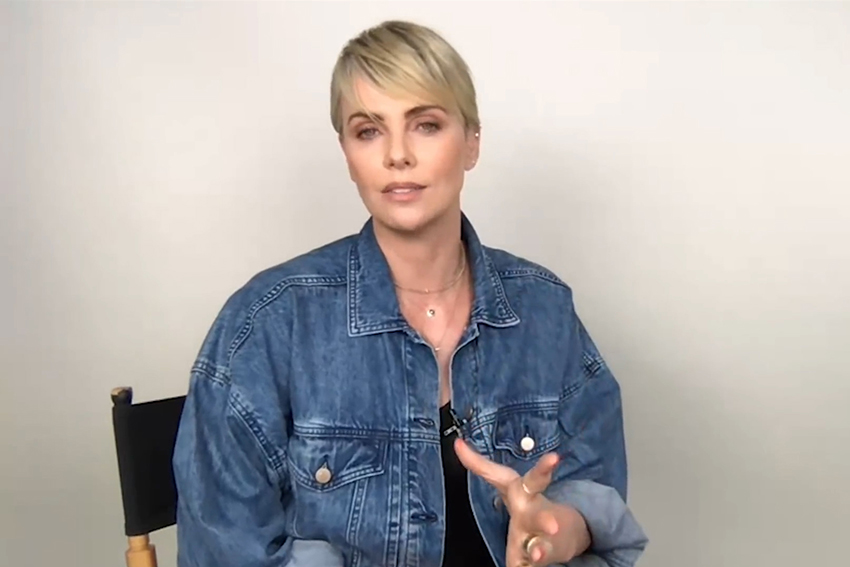
Transcription : Boris Colletier

